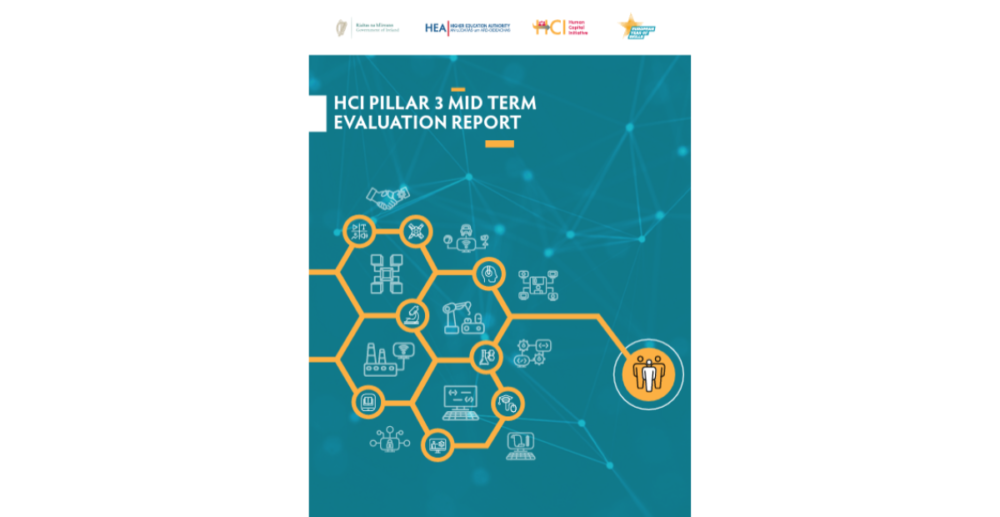
Find information on how to make a Protected Disclosure under the external procedures in place in the HEA.
By Prateeti Chakravarty
Posted: 29 June, 2023

HCI PILLAR 3 MID-TERM EVALUATION REPORT EXCEEDS TARGETS
The Higher Education Authority (HEA) today released its mid-term evaluation report on the Human Capital Initiative (HCI) Pillar 3 projects at the Convention Centre Dublin.
The report, prepared by Indecon International Economic Consultants, was presented at the Collaboration Nation: Linking Higher Education and Enterprise event, which was attended by Minister for Further and Higher Education, Research, Innovation and Science (DFHERIS) Simon Harris TD.
Speaking at the event, Minister for Further and Higher Education, Research, Innovation and Science (DFHERIS), Simon Harris TD, said: “It is imperative that we remain agile and open to new solutions as an economy, and projects such as the 24 on display in Dublin today are testament to what can be achieved with proper support and serious ambition. Ireland is uniquely positioned to become a world leader in educational innovation and the collaboration fostered by HCI Pillar 3 between higher education institutions, local SMEs and global multinationals shows we are on the right path. This collaboration is key, as companies know best what they need, and as we match these needs with individual upskilling and learning, we empower all sides to thrive. It is satisfying to see the bravery and ambition of those involved in funding Pillar 3 rewarded with such early promise.
I congratulate the HEA, the higher education institutions and all of their enterprise partners on their early returns, and wish them continued success.”
The report provided an evaluation of the 24 projects funded by the HEA as part of the €300 million, five-year plan. Aligned with the aims of the National Skills Strategy 2025, the HCI aims to increase capacity in higher education to provide skills-focused programmes designed to meet priority skills needs, by increasing collaboration between higher education and enterprise, with a focus on innovations in teaching and learning.
The report shows that the programme is exceeding targets on the creation of new courses, with over 1,000 created – 800 more than the initial target. Over 4,000 additional student places have been achieved through direct funding, with a significant number still expected as projects mature.
All 24 Projects have been successfully initiated and are largely on target, while governance structures have been established at project level, and the HEA has instituted a strong level of monitoring of progress against pre-agreed targets.
There have been strongly positive responses reported by the 400+ enterprise partners, with whom intensive collaboration has seen over 33,000 engagements, leading to innovation in terms of new technologies, learning methods and curriculum design.
Dr Alan Wall, CEO of the HEA, said: “We are very encouraged by the results of this mid-term report, and expect to see a continuation of these positive trends as the projects mature. It is timely that we are presenting this in the European Year of Skills, and being three years in shows we are ahead of the curve when it comes to giving impetus to lifelong learning and innovation. As the world of education and work undergoes continuous flux, it has never been more important to prepare for change. The collaboration between our higher education institutions and enterprise has been wonderful to see, with both sides flourishing together, and providing strong, tangible outputs that will benefit all. The HCI programme funding provided under Pillar 3 is already making a significant impact with key outputs such as over 4000 additional places and almost 1000 new courses being provided.”
To review the full Mid-Term Evaluation report, please visit: [https://hea.ie/]
For further press information:
Saidhbh Sweeney, Fuzion Communications, saidhbh@fuzion.ie, 086-7887318
Ciarán Ó Raghallaigh, Fuzion Communications, ciaran@fuzion.ie, 086-4410184
NOTES TO EDITOR
The Human Capital Initiative (HCI), a five-year project, investing €300m of National Training Fund (NTF) funding commenced in 2020. HCI aims to increase capacity in higher education to provide skills- focused programmes designed to meet priority skills needs. Pillar 3 of the HCI is the focus of this mid-term review, which represents an investment of over €200m.
Pillar 3 projects are focused on innovation and agility, and are aligned with various national strategic objectives, higher education system objectives and, more broadly, future skills needs for society and the economy.
There are 24 innovative and transformational projects. HCI objectives reflected in the work of the 24 projects include the increased provision of skills needs, futureproofing graduates, embedding transversal skills, and incentivising continued reform and innovation in higher education.
Pillar 3 aims to deliver innovation on more than 200 new and existing higher education courses, projected to impact over 20,000 students. The key outputs at this mid-point exceeded this initial target with close to 1,000 new courses and engagement with over 23,000 learners.